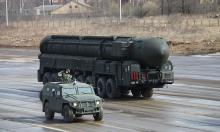The FSB laboratories present...
Several US newspapers, including The New York Post and The Washington Times, as well as The Guardian in Britain, virtually simultaneously ran an advertisement for a new anti-hangover drug called RU-21. According to them, pharmaceutical plants in South Korea are making the treatment, but allegedly under Russian licence. The drug itself is said to have been designed in the laboratories of the Russian Federal Security Service (FSB).
In an attempt to clarify the situation, a RIA Novosti correspondent asked Vladimir Komarov, the leading specialist at the FSB Central R&D Laboratory for Psychophysiology and Psychology of Labour, to comment on the rumours.
"Firstly, RU-21 is not really that unique. There are already quite a few similar treatments in the world. For example, Anti-Hangover has become very popular in Moscow in the last few months, as it neutralises the affects of alcohol quite effectively. It is made at an ordinary pharmaceutical plant and can be bought openly in the capital's pharmacies. Our laboratory does not have anything at all to do with RU-21. The references to the FSB have obviously been made for advertising purposes, but we do have a number of other promising designs.
"They are not always hidden behind a veil of secrecy. The anti-stress drugs from the Trekrezan family were tested in Afghanistan, Chernobyl and Chechnya. Imunofan was created at a rehabilitation treatment for FSB officers (in particular for those serving with the Alfa, Omega and Kaskad units), as well as those who had seen action in other hot spots. The medication is prepared using a synthesis of six amino acids. Imunofan considerably enhances the effect of psychotropic substances and antibiotics, and helps people to come to grips with stress-filled situations without any side effects. Another property of this drug has also become known: if you take it before a nuclear explosion, then the effect of radiation will be cut by six times.
Imunofan was tested on FSB officers wounded in hot spots for several years. Each of them agreed (knowingly and without any pressure) to take part in the experimental trials. The patients were later told that valuable results had been attained, but that a few grey areas remained with regard to how the drug affected the human psyche. Subsequent research revealed that the only influence that the medication had was positive, as it allowed many officers to overcome stress in social situations. It is worth recalling that the secret services were then being re-organised.
Last year, the FSB held the country's first scientific and practical conference on the problems of psychophysical rehabilitation. Many scientists were invited, including those working in counter-intelligence, as well as other from the R&D institutes that were involved with producing Imunofan. Its designers received a prize from the Russian government for their work, which included fundamental and applied research, as well as for serial production of the drug and its distribution to country's network of pharmacies.
The Bionoks pharmaceutical company, which is headed by Dr Vasily Lebedev, produces three million doses of this drug every year.
Subscribe to Pravda.Ru Telegram channel, Facebook, RSS!





